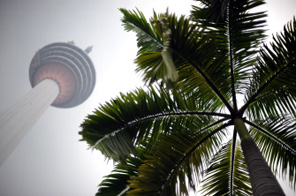Liberalisation no help to Malaysia’s economy
KUALA LUMPUR: Malaysia's recent liberalisation moves are having little immediate success in reviving the economy, a leading think tank said Thursday as it downgraded its 2009 growth forecast.
The influential Malaysian Institute of Economic Research (MIER) cut its projection to a 4.2 percent contraction from 2.2 percent shrinkage, saying business and consumer confidence remained "fragile".
It also downgraded its 2010 forecast to an expansion of 2.8 percent, from 3.3 percent previously, in anticipation of a gradual U-shaped recovery.
The group commended Prime Minister Najib Razak for his liberalisation moves, which are unravelling a decades-old policy of positive discrimination for Muslim Malays that many said harmed the country's competitiveness.
But it said the measures -- including opening up parts of the service industry to foreign investors and removing an ethnic-based equity requirement for newly listed companies -- had come too late.
"It helps boost investor confidence in the economy, but many of these measures will take time to bear fruit... it does not influence the current situation," said MIER chief Mohamed Ariff Abdul Kareem.
"If they had been announced in good times you would have seen immediate results," he said. "But these are good measures taking us in the right direction and will help remodel the economy when the crisis is over."
Mohamed Ariff tipped the fiscal deficit to exceed 8.0 percent of GDP this year -- against a government forecast of 7.6 percent -- and said it could rise to 8.0-10.0 percent in 2010.
"But this is nothing to be worried about... this is not the time to balance the books," he said, while adding that Malaysia had a poor record on fiscal discipline with only a handful of surpluses in the past half-century.
Najib said in May, after the release of data showing the economy shrank 6.2 percent in the first quarter, that Malaysia's economy is likely to contract by 4.0-5.0 percent this year due to a steep decline in exports and manufacturing.
Mohamed Ariff said he expected the economy to contract by about 6.0 percent in the second quarter, followed by a decline of about 4.0 percent in the third quarter, with contraction slowing to about 2.0 percent in the fourth.
"As long as the US and Europe remain sedated, we cannot really recover. We need our exports to recover," he said, adding that even if China powers out of the downturn it would not be enough to pull Malaysia along with it.
Malaysia has announced two stimulus packages, the most recent in March billed as containing some 60 billion ringgit (16.8 billion dollars) in measures to pump-prime the economy.
However, Mohamed Ariff said much of the advertised figure was "padding" and that the economy would benefit from another 8.0 billion ringgit in genuine government spending.






